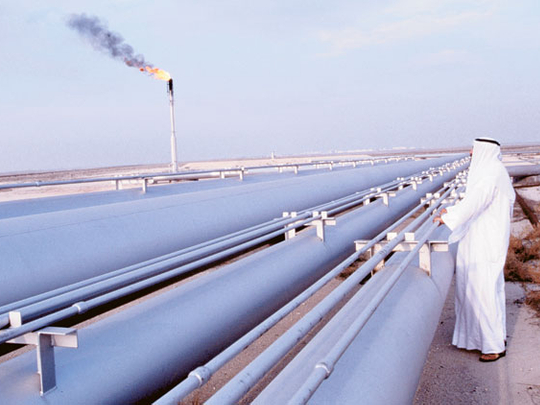
Dubai: With the price of crude hitting $100 per barrel, Kuwait appears to have no worries on the fiscal front. The same cannot be said, however, of its political firmament.
An estimated 94 per cent of revenues come from oil exports by the Organisation of Petroleum Exporting Countries' fifth-largest producer. The country produced 2.30 million barrels of oil a day on average last year, according to Bloomberg data.
Kuwait's oil revenue ratio is one of the highest among the six Gulf Cooperation Council nations, and is expected to result in a fiscal surplus upwards of $25 billion when the country takes fiscal stock of the financial year on March 31.
Kuwait posted a preliminary budget surplus of 7 billion dinars in the first nine months of the fiscal year as oil revenue exceeded forecasts, the Finance Ministry said.
Revenue was 15.13 billion dinars and spending was 8.09 billion dinars, according to data posted on the ministry's website. About 10 per cent of revenue will be saved in the Reserve Fund for Future Generations.
Financial risks
Oil revenue was 14.12 billion dinars in the nine months to December 31 while non-oil revenue was 1 billion dinars, the data showed.
Kuwait recorded a budget surplus of 6.44 billion dinars in the 2009-10 fiscal year after oil revenue was more than double the forecast.
The country, which has posted a surplus for the last 11 consecutive years, projected a budget deficit of 6.6 billion dinars in the current fiscal year that started April 1, based on an oil price of $43 a barrel.
Spending was forecast at 16.31 billion dinars and revenue at 9.7 billion dinars. Oil is currently trading at about $97.
Kuwait saw its revenues during the fiscal year ending March 2010 reach 18 billion dinars.
Oil earnings in 2009-10 reached 16.8 billion dinars, 143 per cent higher than the conservative budget estimates, while non-oil earnings were 1.07 billion, 5.6 per cent higher than estimates.
"The financial risks [from the global economic meltdown] now appear to be under control and the mood worldwide is improving," Dr Jarmo Kotilaine, chief economist at the Saudi Arabia-based National Commercial Bank, told Gulf News in a telephone interview.
"I believe what we are seeing [in Kuwait] is the consolidation of a rebound," Dr Kotilaine added.
Unlike the other GCC countries, Kuwait does not peg its currency strictly to the US dollar, instead targeting a basket of currencies.
Nancy Fahim, an economist at Standard Chartered bank, UAE, said: "The components of Kuwait's currency basket are not disclosed. However, our in-house calculations show that the dollar component of the basket increased last year at the expense of the euro."
Long-term growth will continue to depend on oil output, and thus on fluctuating international prices. Oil production capacity is expected to increase steadily through projects that are part of a four-year investment plan announced by the government.
An increase in oil capacity is expected to maintain high growth in gross domestic product, according to analysts at the Economist Intelligence Unit (EIU).
"Kuwait is expected to continue to report robust fiscal surpluses, which, given the low level of public debt, will mean that debt servicing will be easily manageable in 2011-12," the EIU said.
Adding that currency risk is in "positive" territory, the EIU added: "Kuwait's large fiscal and current-account surpluses, coupled with a huge stock of foreign assets, will support the Kuwaiti dinar throughout the forecast period.
"More moderate import growth and more sustainable levels of bank lending are providing additional support to Kuwait's currency risk rating."
The banking sector, EIU added, is stable in spite of facing risks from the fallout from the economic slowdown in the region in 2009, "given its exposure to defaulting companies and high levels of real estate sector and personal loans".
Galloping activity
However, the Central Bank of Kuwait has ample resources to ensure that the sector has adequate liquidity, it said.
Even a sustained slump in oil prices, though highly unlikely given galloping economic activity in China, India, Brazil and Germany, will not have too much of a deleterious effect on Kuwait's finances.
"Kuwait's economy is heavily dependent on the oil sector. However, its large foreign assets and fiscal and external surpluses would provide support for its economic position even in the event of a sustained slump in oil prices," the EIU said.
Structural reforms
Kuwait has never defaulted on its debt, even during the Iraqi occupation of the country in 1991.
If the fiscal and external accounts were to come under sustained pressure, the country would be able to tap its comfortable official foreign-exchange reserves, which were equivalent to eight months of import cover at the end of 2009, as well as other foreign assets.
External debt servicing is easily manageable: the debt-service ratio was an estimated 3.2 per cent in 2009, although this is slightly higher than the average of A-rated countries and is expected to rise to an average of 3.8 per cent in 2011-12.
On the other hand, the government has some large off-balance-sheet liabilities.
The social security fund sits on a large actuarial deficit, and although the government has allocated substantial funds in recent budgets to make up some of the shortfall, without structural reforms the deficit will continue to rise.
The government's implicit guarantee of much of the rapidly rising private-sector debt is a further vulnerability.












